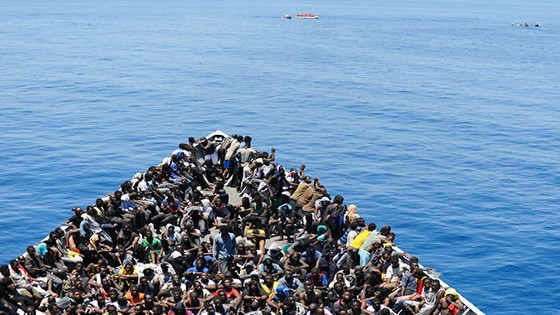On 12 October, the Parliamentary Assembly of the Council of Europe (PACE) adopted two resolutions relating to migration and asylum: Pushbacks on land and sea: illegal measures of migration management and Safe third countries for asylum seekers.
The first resolution, based on the report by Pierre-Alain Fridez (Switzerland, SOC), proposes a set of measures for preventing pushbacks, protecting, prosecuting those responsible for pushbacks, and improving international co-operation and co-ordination between border authorities, police and other bodies in charge of border protection. It also calls on the European Border and Coast Guard Agency (Frontex) to enhance its capacity in this respect.
The second, prepared by Stefanie Krisper (Switzerland, SOC), emphasises that no absolute presumption of safety can be made and encourages the development of procedural requirements at the Council of Europe level for the asylum seeker to have a fair possibility to rebut the presumption of safety. The Parliamentary Assembly encouraged member States to establish objective and independent monitoring mechanisms to monitor national law and practice in this regard.
The vice-governor of the Council of Europe Development Bank (CEB), Tomáš Boček, exchanged of views with members of the PACE Committee on the CEB role in enhancing European solidarity across states to provide services to migrants, refugees and displaced people. The discussion was held in the context of the report being prepared by Lord Dundee (United Kingdom, EC/DA) on “European solidarity in the context of asylum and international protection” and as a follow-up to Resolution 2448 (2022) on “Humanitarian consequences and internal and external displacement in connection with the aggression of the Russian Federation against Ukraine” adopted in June 2022.
In December, PACE Migration met in Paris. A large part of the discussions held, was focused on the examples of integration programmes in host society at the local and the national level. A prominent football coach and social inclusion programme leader, Nagin Ravand, provided inspiring insights into benefits of sports in treating forced displacement-induced trauma, and on how empowering may be for women and girls in particular. to be part of a team and practice sport.
In the context of the upcoming report by Nigar Arpadarai (Azerbaijan, EC/DA) on “Social inclusion of migrants, refugees and internally displaced persons through sport”, the committee also heard from the Diplomatic Advisor of the French Ministry of Sport and the Olympic and Paralympic Games, Paule Ignatio.
In addition, the role of local authorities was given a strong focus thanks to the participation of Bernd Vöhringer (Germany, EPP/CCE), President of the Chamber of Local Authorities of the Congress of Local and Regional Authorities, and Mayor of Sindelfingen.
On the eve of the Council of the EU’s decision on the full application of the provisions of the Schengen acquis regarding Bulgaria, Croatia and Romania, PACE Committee on Migration, Refugees and Displaced persons adopted a statement welcoming the enlargement of the Schengen Area and cautioning against excessive measures that result in breaches of refugees’ and migrants’ human rights.
On International Migrants Day, Theodoros Rousopoulos (Greece, EPP/CD), the Chairperson of the Committee on Migration, Refugees and Displaced Persons, recalled the importance of upholding human rights for all. This should become a reality in the 21st century for migrants and refugees.
The principle of equal rights for all migrants, whatever their status, lies at the core of the UN Convention on the Protection of the Rights of All Migrant Workers and Members of their Families, adopted on 18 December 1990. This core principle is fully aligned with Article 1 of the European Convention on Human Rights which guarantees equal access to rights and freedoms to everyone within the jurisdiction of member States, stated Mr Rousopoulos.
Finally, on 24 November, the CCBE Migration Committee, invited Tatiana Termacic, Head of the Secretariat, to present the work of the Committee and discuss further ways of cooperation. The focus was placed on the issues of pushbacks, integration of migrants, the humanitarian consequences of the war in Ukraine, the crisis in Afghanistan, and the concrete role that lawyers can play in upholding human rights standards when dealing with migration cases.



